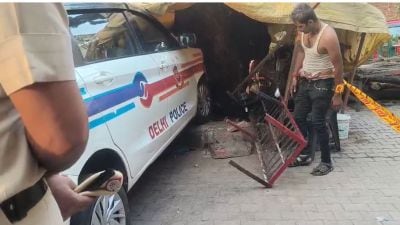His business: build cart, cart water
Sylvia's home has no taps. So twice every day, she walks almost a kilometre to the point where we met her because that’s where the only...

Sylvia’s home has no taps. So twice every day, she walks almost a kilometre to the point where we met her because that’s where the only tap her children have known exists: water trickles from a split bamboo shoved into a mountain spring.
From Sonapur to Jowai to Shillong on National Highway 44, the clamour for water echoes in the Meghalaya hills. Weary women tell you how half the day is lost in fetching water while the other half is spent in stacking up firewood by the roadside and waiting for trucks to show up and buy this fuel for the towns. As in every election, this time too, they promise to quench your thirst as they come looking for votes. The promises are never kept and perversely, this has made Prim a rich man.
Prim used to work in the coalfields near Jowai but he switched trade a couple of years ago. He now makes little wooden carts, very handy when it comes to wheeling home precious water cans. Each cart sells for more than Rs 500. ‘‘Business is good,’’ he grins.
His water carts, he maintains, will never be out of circulation: ‘‘When they come for votes, they promise water. Once you vote, they disappear. So I am a useful man here. I plan to hire more hands, expand my business. You must go to the interiors. The water situation there is worse.’’
You can’t fault Prim for the killing he makes. He is, after all, filling a gap which, as old Sam Marbaniang in Shillong points out, is the job of the government. ‘‘You say this road’s the lifeline. The government says so many schemes have been completed. But then why are we still drawing water, cleaning, washing by the roadside? Someone should explain.’’
Marbaniang scoffs when you mention some of the schemes on the anvil. ‘‘The pace at which they bring down governments here is remarkable. If they had shown the same energy in working for the people, this situation wouldn’t have been there. They are so busy toppling each other, they have no time for any work.’’
He has a point. In recent years, Meghalaya has seen governments change with the season, the outcome of coalition politics. It finally has a government with an absolute majority. But you can never tell. Left to its fate, Shillong, the state capital, has burst at the seams. Ugly concrete structures dot the hills and slopes, its roads unable to take the traffic load anymore. Its beautiful face scarred, Shillong can no longer claim to be the pride of the hills.
The worry is it will go the same way as Guwahati. And as you enter Guwahati, you realise what inept handling can do to an expressway meant to change the face of the region.
On the 14-km stretch already in place, you have to steer clear of cattle, rickshaws, two-wheelers, parked trucks. Someone needs to get them off before the hurt worsens, before this great symbol of development becomes just another road, another entry in a list of money pumped and lost.
Photos





- 01
- 02
- 03
- 04
- 05


























